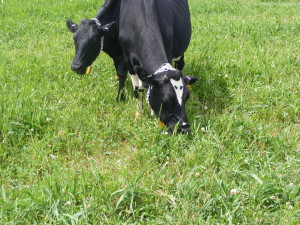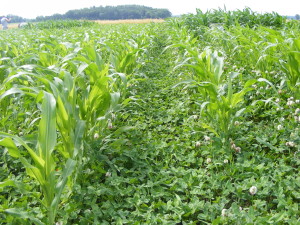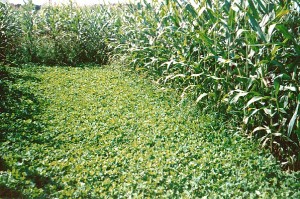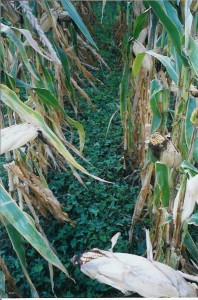Kura Clover is an interesting option for cover cropping no-till corn producers. Why? Because Kura Clover forms a “living mulch.”
I have been working with Dr. Ken Albrecht from the University of Wisconsin-Madison on Kura Clover since the summer of 2000. During that summer as I traveled through eastern Iowa and NW Illinois I envisioned that before 2005 all of that region would have Kura Clover on it!
That never happened. But I am still very excited about Kura Clover as a feed source and cover crop.

What’s so great about Kura clover?
Kura clover:
- Produces high yields with little additional nitrogen
- Fixes gobs of nitrogen
- Forms a “living mulch”
- Survives forever – stands last 30+ years
- Makes livestock producers/row crop farmers smile
- Provides diverse options in the field
- Saves cover croppers money – a one time investment in seed
- Controls erosion
- Is easy to work with in corn production
Why hasn’t Kura clover taken over the cover crop/forage world?
- It establishes slowly.
- It requires livestock (cattle or sheep) to be a part of the program for optimal benefit.
- You cannot plant corn into Kura Clover every year.
- You cannot plant soybeans into Kura Clover.
- It must be inoculated with a special inoculant for it to establish/thrive.
- It costs a lot in establishment year.
- There are few producers of Kura clover seed – the biggest is CISCO Seeds.



Dave,
Could you explain why corn on corn in Kura is limited?
I am interested in trying 5-10 acres on my farm in Penn Yan NY. If I seed Kura in the spring of 2014, do I need to wait till 2015 year before planting corn? (I plan to zone till the corn) And what is the recommended mow schedule the establishment year?
I’m wondering if rotating to a vegetable crop such as pumpkins or brassicas or other vegetables would work since continuos corn is not recommended?
The only animals I have are deer, which I hunt…but I was wondering if domestic turkeys would thrive on it? Guess I’ll find out what the wild turkeys think of it.
Thanks!
Leland
Leland,
If you plant Kura in Sp 2014 it may be 2-3 years before you can plant corn as it establishes so slowly. So realistically plan on the first corn planted in the field of Kura in 2016-2017. I have found after many years of trial and error that planting Kura with a forage grass (I like Orchardgrass) along with 3# Red clover and 1# white clover will create a beautiful pasture/hay field for a few years as the Kura gets established. After that you kill off the other clovers and orchardgrass and plant corn into your Kura. After the first year of corn give the field a rest from corn and plant pumpkins or some other N-feeding vegetable crops that year. Mow the field just enough to “control” the growth. This gives some rest time to the Kura.
After that come back to corn the following year. Kura needs to “mend” and “rebound” occasionally otherwise you will kill it out over time…especially early in its life. Dave
More kura questions.
1) Do you know of a consistent source for kura seed? It is very tough to find!
2) I have planted some kura this year along with red and white clovers is smaller amounts, as you suggested. But how do you kill off the other clovers once the kura is thriving? Is there a selective herbicide?
Thanks!
Thanks for your questions. #1 there is no longer a consistent source for Kura Clover seed that I am aware of. The two sources to check with are The CISCO Companies out of Indianapolis 800-888-2986 and Welter Seed and Honey out of Onslow, Iowa 800-728=8450. Those two sources seem to have the most reliable access to Kura seed. #2 As long as you graze or harvest the clover mixture you will eventually be rid of the red clover. The white clover will be in with the Kura for some time but depending on how you are using the Kura (feed source or cropping) you will either a) enjoy the benefits of grazing the clover mix or b) kill the white clover off when you spray the Kura as you plant corn into it. There is no selective herbicide. However, Kura will come back nicely after sprayed with Glyphosate whereas other clovers are less prone to do do so (although they will not die with one spraying).